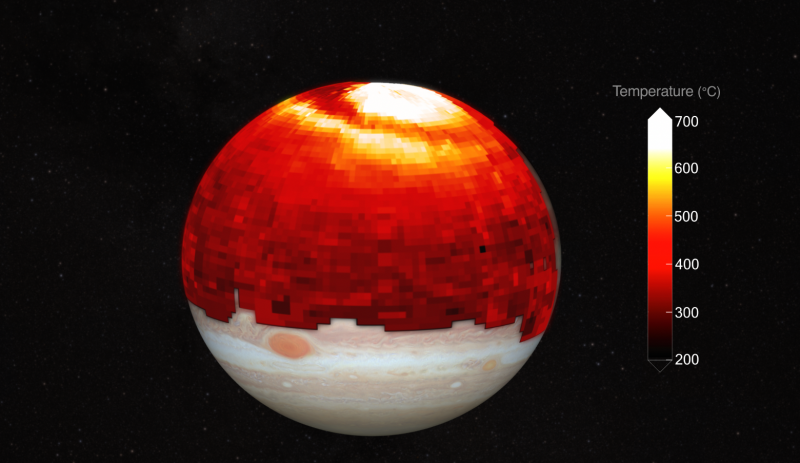Heatwave on Jupiter
Europlanet reported in late September 2022 that researchers had discovered an unexpected heatwave extending across 10 Earth-diameters in the atmosphere of our solar system’s biggest planet, Jupiter. In other words, Jupiter’s atmosphere – which is famous for its wide, colorful bands and giant storms – is also unexpectedly hot. It’s hundreds of degrees hotter than models predict. It’s thought that Jupiter’s mighty auroras can explain these higher-than-expected temperatures.
James O’Donoghue, of the Japanese Aerospace Exploration Agency (JAXA), presented these results in late September at the Europlanet Science Congress (EPSC) 2022 in Granada, Spain.
They reminded their audience that Jupiter orbits the sun much farther away than Earth does. Earth is the 3rd planet, and Jupiter is the 5th planet, outward from the sun. So, Jupiter receives under 4% of the amount of sunlight that Earth receives. And, as a result, its upper atmosphere should be a frigid -94 degrees Fahrenheit (-70 degrees Celsius), these scientists said. But, instead, its cloud tops are measured across the planet at 752 F (over 400 C). O’Donoghue explained:
Last year we produced – and presented at EPSC2021 – the first maps of Jupiter’s upper atmosphere capable of identifying the dominant heat sources. Thanks to these maps, we demonstrated that Jupiter’s auroras were a possible mechanism that could explain these temperatures.
Jupiter’s atmosphere should be cold, but isn’t
The Voyager 1 spacecraft first spotted Jupiter’s auroras in 1979. And, as on Earth, the stream of charged particles from the sun known as the solar wind cause auroras on Jupiter. On Earth, aurora-chasers know to look for auroras during times of intense solar activity. Now you see the auroras, and now you don’t. But Jupiter’s auroras are permanent. And they are variable in intensity. According to O’Donoghue and his colleagues:
[Jupiter’s] powerful auroras can heat the region around the poles to over 700 degrees Celsius, and global winds can redistribute the heat globally around Jupiter.
A closer look at data found a heatwave
As they delved more deeply into their data, O’Donoghue and his team found the spectacular heatwave just below Jupiter’s northern aurora. They found it was traveling toward Jupiter’s equator at a speed of thousands of kilometers per hour. They said:
The heatwave was probably triggered by a pulse of enhanced solar wind plasma impacting Jupiter’s magnetic field, which boosted auroral heating and forced hot gases to expand and spill out towards the equator …
While the auroras continuously deliver heat to the rest of the planet, these heatwave “events” represent an additional, significant energy source. These findings add to our knowledge of Jupiter’s upper-atmospheric weather and climate, and are a great help in trying to solve the ‘energy crisis’ problem that plagues research into the giant planets.

Bottom line: Scientists have discovered a heatwave on Jupiter. That is, its atmosphere should be cold because the planet is far from the sun. Instead, it’s hot. Scientists believe the giant planet’s auroras generate and drive this heat.











